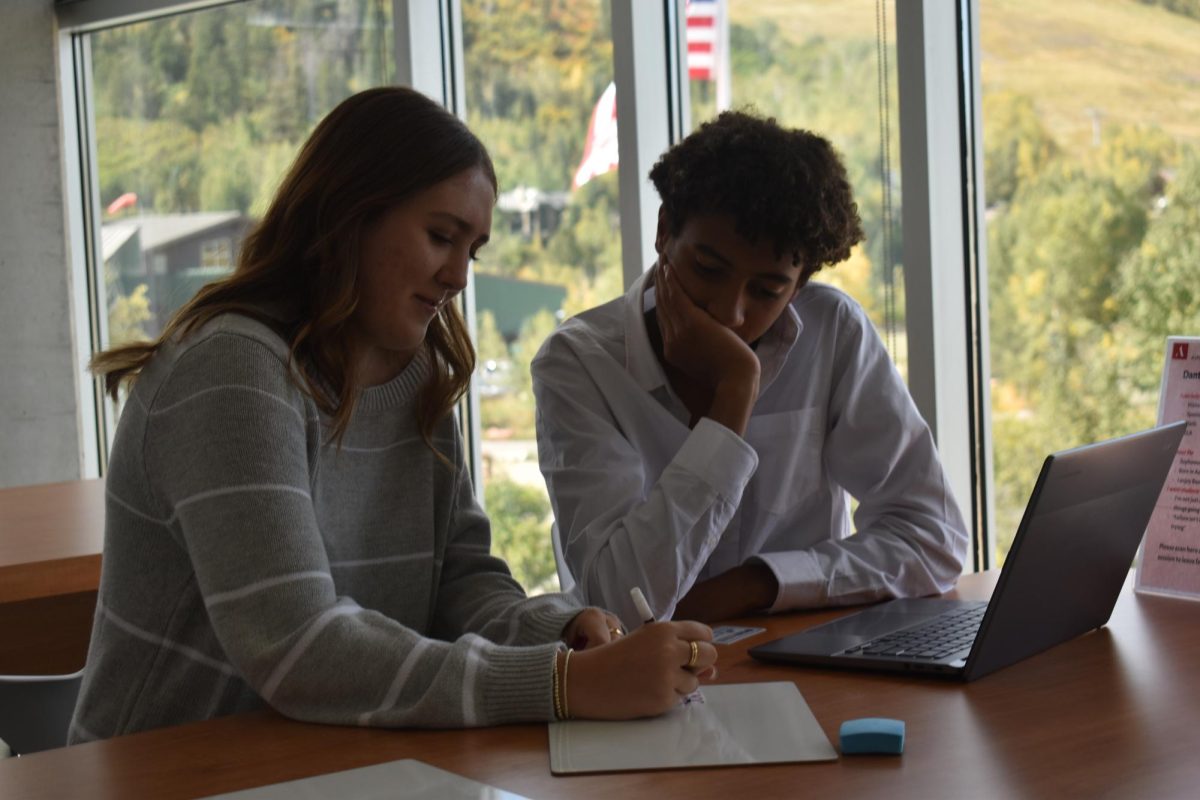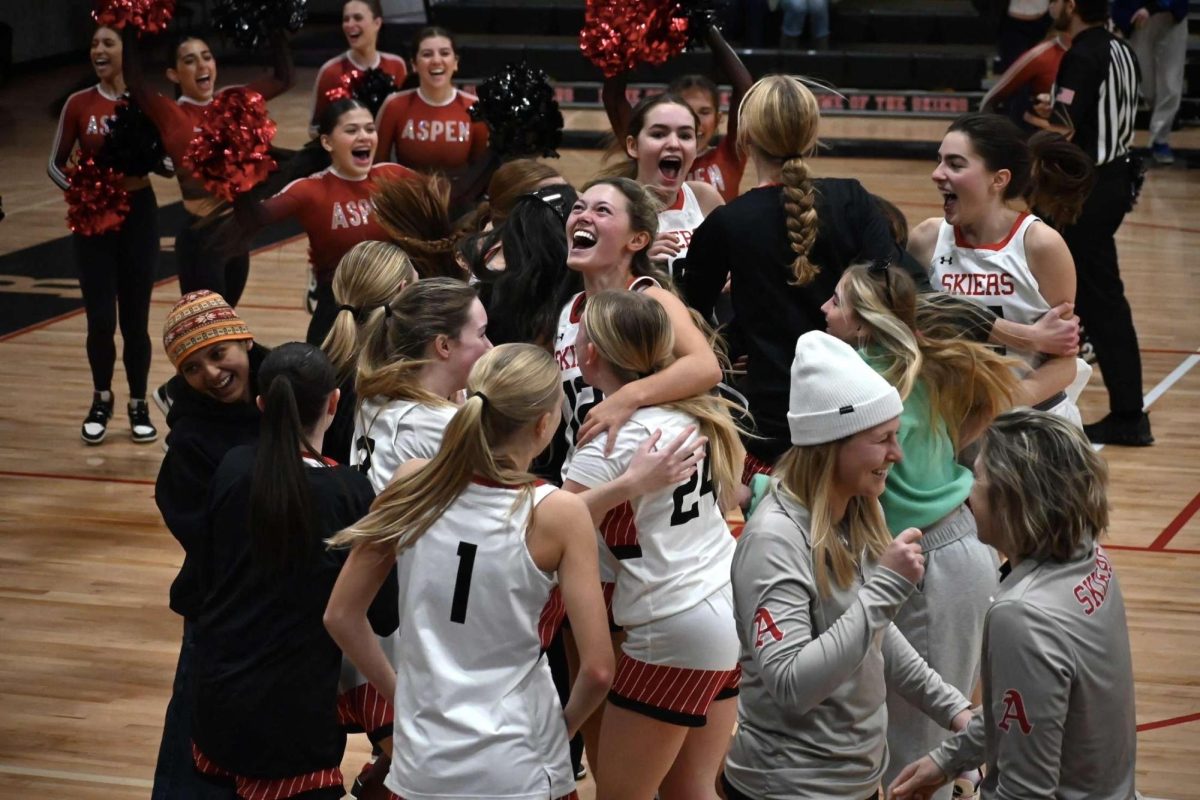The plus-side of positivity
Photo by Katelyn O’Callaghan and Aja Schiller
A collage of the different people interviewed playing and coaching their respective sports with a positive attitude.
Aspen High School prides itself on cultivating high functioning athletic teams as well as esteemed performances that bring recognition to the school, but it’s what makes a team great that AHS truly prides itself on. Whether it be the Swim Team or the Ski Team, positivity and good attitudes shape the way that athletes perform and interact with each other.
Positive mindsets have had a proven effect on athletes. According to the American Psychology Association, 77 percent of athletes performed better after positive self-talk and confidence boosting affirmations. A good team and healthy relationships have also helped Aspen High students with their athletics.
Andrew Vallone, a sophomore at AHS and a player on the AHS boys baseball team, has seen the effects of positivity on his team. The AHS baseball team won two out of 22 games this past season.
“Positivity has improved our performance ability. In the two games we won, we went into it thinking we were going to win, and we ended up having a lot of positive energy in the final inning, and we won. The next game we won was after the first one, and we still had that positive energy that helped us win,” said Vallone.
Not only do the student-athletes notice the benefits of a healthy mindset, but the coaches see it as well. Joey Dziedzic, the AHS baseball coach and an AHS Spanish teacher, spoke out about the effects of a good mindset and how he was able to watch the mentality in his team over the past season.
“The positive kids bring out positivity from their teammates as well. So when a kid is positive, the whole team responds well too. It helps with their performance because they know even if they make a mistake their team will still support them,” said Dziedzic. “Especially with younger kids, you’re trying to bring them up, instead of pushing them down. You want them to do better and be able to grow and learn from their mistakes, not to be in fear of making them.”
Just like Dziedzic, Kathleen Callahan, a local sports psychologist, and coach of the AHS Swim Team has been able to watch her swimmers flourish under a good attitude. She trains her athletes to speak positively about themselves as well as teammates through positive affirmations and Cognitive Behavioral Therapy.
“Your brain has one job to do, and it does it exquisitely well. It listens to what you say, and it wants to prove you right. So if you’re doing a sport and you’re thinking ‘I’m dying’ then your brain is going to say ‘nope I can’t go any further’. However, if you say ‘I’ve got this, we can get through it’ then you succeed, “ said Callahan. “So I do a lot of prescribed self-talk for races, and it’s all positive. I combine Cognitive Behavioral Therapy and neuro-linguistic programming in my sports psychology, and that’s what I try to give the girls at Aspen High School.”
One of Callahan’s swimmers, Carolina Robinson, felt the change in her performance after Callahan helped her conquer her negative thinking patterns.
“I think that a positive attitude makes everyone swim a little bit better. I used to think that the whole positive attitude thing didn’t really work, but then at a meet, I was surrounded by positive attitude people because Kathleen put me in that environment, and it helped me make States,” said Robinson. “People don’t normally realize this, but having a negative attitude subconsciously makes you think ‘I can’t do this’ and makes you do poorly.”
The AHS Swim Team was riddled with controversy this past season and Julia Haugan, AHS alumni, mentioned this as she reflected on the year. Haugan recounted on how a better mindset for the swimmers would have helped more of them reach States.
“I think just as a whole team community there was so much drama between the girls, and of course the coaches too; there’s just a lot of things going on. Lots of negativity that wasn’t exactly good for team dynamic,” said Haugan.
Callahan holds the same mindset of positive mind over matter as many other coaches, one of whom is Jennifer Morandi-Benson, the AHS girl’s Ski coach and U.S History Teacher.
“My whole coaching philosophy revolves around positivity, and if someone doesn’t think they can, they won’t. Positivity is contagious. If the person next to you is positive, it’s hard not to be,” said Morandi-Benson.
Olivia Plummer, a sophomore at AHS and ski racer on the AHS girls Ski Team, experienced the positivity phenomenon during a ski race.
“Having a supportive team when you’re racing makes a huge difference. It makes me a better skier and person,” said Plummer. “One race day I was feeling really bad, but my team helped me with my attitude, and I was able to pick up my times.”
Not only does positivity affect kids on the slopes, but it also helps kids on the ice. Kristen Spang, an AHS girls hockey player, helped bring her team to a state’s win through hard work, positivity and team spirit.
“A positive atmosphere and mindset helps me to play better. If I’m in a negative mood, I start beating myself up. I instantly think ‘I’m not going to do well’ and I don’t feel helpful to the team,” said Spang. “ My team this year was really positive and I honestly believe that helped us win states.”
Whether it’s racing slopes, gliding across the ice, or hitting a home-run, positivity helps athletes perform their best, both mentally and physically.
“We have a new youth that is coming to us, and they bring a lot of issues that we [coaches and players] have to face. I think sports are more important for emotional development than physical [development] and having a positive mindset facilitates growth and development that will prepare these kids for the challenges of life,” said Callahan.

Aja is currently a senior and has been writing with the Skier Scribbler since she was a freshman. She's spent her quarantine growing new plants, reading,...



























